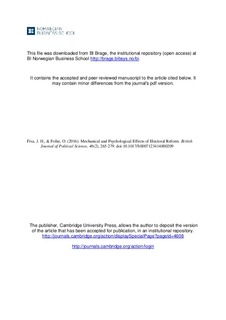Mechanical and psychological effects of electoral reform
Journal article, Peer reviewed
Accepted version

View/
Date
2016Metadata
Show full item recordCollections
- Publikasjoner fra CRIStin - BI [1030]
- Scientific articles [2189]
Original version
British Journal of Political Science. 2016, 46 (2), 265-279. 10.1017/S0007123414000209Abstract
To understand how electoral reform affects political outcomes, one needs to assess its total effect, incorporating how the reform affects the outcomes given the political status quo (the mechanical effects) and the additional reactions of political agents (the psychological effects). This article proposes a framework to ascertain the relative magnitude of mechanical and various psychological effects. The empirical approach is based on pairwise comparisons of actual and counterfactual seat allocation outcomes. It uses the design to analyze a nationwide municipal electoral reform in Norway, which changed the seat allocation method from D’Hondt to Modified Sainte-Laguë. The study documents clear psychological effects.